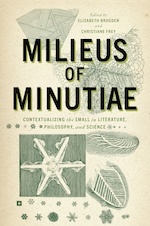Today, we are happy to bring you our conversation with Elizabeth Brogden and Christiane Frey, editors of Milieus of Minutiae: Contextualizing the Small in Literature, Philosophy, and Science
What inspired you to write this book?
When we first met as fellows at the Institute for Cultural Inquiry in Berlin in the fall of 2017, it quickly became apparent that we shared a common passion, namely: the importance of “minutiae” to so many diverse fields of knowledge and methodological approaches. We had arrived at the topic from different angles (Elizabeth through early detective fiction and theories of close reading, Christiane through research on the infinitesimal and the microscopic both in literature and in early modern philosophy), but were in enthusiastic agreement about the need of an interdisciplinary, transhistorical study on the significance of the detail and the minute. A project was born.
What did you learn and what are you hoping readers will learn from your book?
It struck us how the many different fields of knowledge and disciplines converge when it comes to detecting the often uncanny impact “minutiae”–the tiniest phenomena and beings–can have on the ways we deal with and conceive of our objects of research.
What surprised you the most in the process of writing your book?
It so happened that the book came together during the pandemic. In the midst of the most challenging and bleak time, we saw our topic become relevant in a completely unexpected way.
What’s your favorite anecdote from your book?
The volume emerged out of an initial conference, hosted in Berlin in May 2019, and has grown from there. One of our greatest worries, at the outset, was how all the different chapters would fit together, since they span such a broad temporal, disciplinary, and methodological range. Ultimately, though, we were astonished by how organically the chapters spoke to each other, in both explicit and implicit ways. The chapters organized themselves almost naturally, and in writing the introduction we felt that we simply became mediums channeling their secret conversations.
What’s next?
Christiane: The topic of “milieus of minutiae” will stay with me for a while. One of my current book projects is an (eco-)historical study on “micrologies of knowledge and narration” from Francis Bacon to the German 19th-century author Heinrich von Kleist, and it explores the long history (or histories) of smaller things and details in their concreteness. What interests me most is the entanglement of “minute bodies” (as Robert Hooke has it) with and within their diverse environments and their relatedness to other “minutiae.”
Elizabeth: I have a journal article on Edgar Allan Poe’s proto-detective tales in the “age of the novel” forthcoming in 2025, which deals with the relationship between detail and interiority with respect to literary character. Alongside my scholarly interests, I’ve also started to pursue public writing and creative nonfiction in a more serious way, so I have a number of non-academic essay projects on the agenda for the new year.





